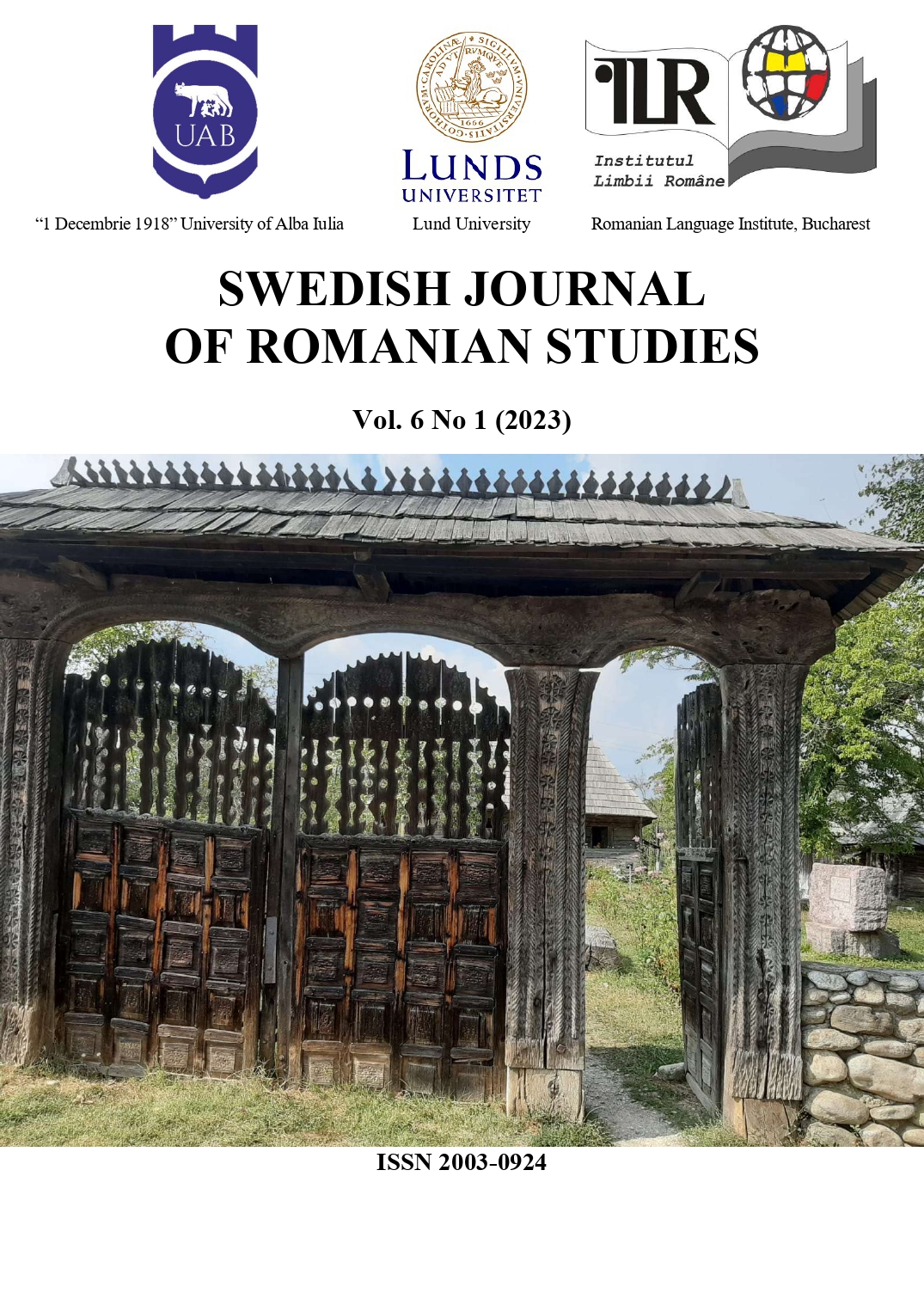Dinamica formelor și a relațiilor sociale în grupările socialiste din secolul al XIX-lea
The dynamics of social forms and relations in the socialist groups of the 19th century
DOI:
https://doi.org/10.35824/sjrs.v6i1.24895Keywords:
sociability, social network, weak ties, social imaginary, forms of life, socialist movementAbstract
Focusing on two theoretical concepts, sociability, driven from Maurice Agulhonʼs theory, and social networked as developed in Georg Simmelʼs formal sociology, the present article aims to discuss the Romanian socialist circles from the 19th century in a twofold manner. On the one hand, it explores the social imaginary and the transferable social forms due to the existence of the “weak ties” (Mark Granovetter), such as clandestinity, the anti-bourgeois attitude, the idealism, and the generic portrait of the socialist. On the other hand, the article analyses the forms of life that are specific and dependent on the material spaces, shaping the particularities of different socialist groups. Such elements of shared life are, for example, the exaltation in Neculai Beldiceanuʼs cenacle from Iași, the anti-intimacy in Nădejdeʼs house on Sărărie, the farce at „Adevărul” magazine, but also the experience of drinking tea, common to the majority of the socializing groups, and the relationship between men and women, considered as the myth of the 19th century socialist movement.
References
A. Corpus
Atanasiu, I.C. (1932). Pagini din istoria contimporană a României, 1881-1916, vol. I: Mișcarea socialistă 1881-1900/ Pages of Contemporary Romanian History, 1881-1916, vol I: The Socialist Movement 1881-1900. București: Adevărul.
Avramescu, T. (Ed.) (1975). Amintiri literare despre vechea mișcare socialistă/ Literary Memories about the Old Socialist Movement. București: Minerva.
Gorovei, A. (1930). Alte vremuri. Amintiri literare/ From Other Times. Literary Memories. Fălticeni: Tipografia și Librăria „J. Bendit”.
Graur, C. (f.a.). Portrete socialiste/ Socialist Portraits, București: Șantier.
Ibrăileanu, G. (2010). Amintiri din copilărie și adolescență/ Memories of Childhood and Adolescence. În Scrieri alese/ Selected Works (A. Patraș, R. Patraș, eds.). Iași: Editura Universității „Alexandru Ioan Cuza”.
Mille, C. (1913). Dinu Milian, vol. I. București: Adevărul.
Teodorescu, I., Sadoveanu, I. (1980). Amintiri/ Memories (A. Avramescu, ed., T. Avramescu, introd). București: Eminescu.
B. Bibliografie critică
Agulhon, M. (1966). La Sociabilité méridionale. Confréries et associations dans la vie collective en Provence orientale à la fin du XVIIIe siècle/ The Meridional Sociability. Communities and Associations in the Collective Life of the Oriental Provence at the end of 18th century. Aix-en-Provence.
Alexandrian (1979). Le Socialisme romantique/ The Romantic Socialism. Paris: Seuil
Bénichou, P. (1996). Le Sacre de l'écrivain, 1750-1830: Essai sur l'avènement d'un pouvoir spirituel laïque dans la France moderne/ The Consecration of the Writer, 1750-1830. Paris: Gallimard.
Bénichou, P. (1977). Le Temps des prophètes: Doctrines de l'âge romantique/ The Time of the Prophets. Doctrines in the Romantic Age. Paris: Gallimard, 1977.
Cuzmici, L. (2015). Generația Albatros – o nouă avangardă/ Albatros Generation – a New Avant-garde. Iași: Editura Universității „Alexandru Ioan Cuza”.
Diaz, J.-L. (2012). «De l’écrivain au traducteur imaginaires. Entretien avec José-Luis Diaz au sujet de sa théorie de l’auteur»/ Of imaginary writer and translator. Interview with José-Luis Diaz about his theory on the author (Karen Vandemeulebroucke, Elien Declercq, interviewers). In Interférences littéraires/Literaire interferenties, 9.
Dohotaru, A. (2015). Portraits of Young Socialists: Moral Standing and Socializing Places. In Anuarul Institutului de Istorie „George Barițiu” din Cluj-Napoca, 54. 249-264.
Engels, F. (1880). Socialism: Utopian and Scientific. https://www.marxists.org/archive/marx/works/1880/soc-utop/ch01.htm.
Gârdan, D. (2020). Privind de departe modernitatea: Cazul „Sburătorul”/ A Distant View towards Modernity: The Case of “Sburătorul”. In Vatra, 8-9. 87-92.
Ginsburg, C. (2012). Threads and Traces. True False Fictive (Anne C. Tedeschi, john Tedeschi, trans.). Berkley and los Angeles/ London: University of California Press.
Glinoer, A., Laisnay, V. (2013). Lʼâge de cénacle. Confraternités littéraires et artistiques au XIXe siècle/ The Time of the Cenacle. Literary and Artistic Confraternities in the 19th Century. Paris: Fayard.
Granovetter, M. (1973). The Strength of Weak Ties. In American Journal of Sociology, 78 (6), 1360-1380.
Heinich, N. (2005). L’Élite artiste. Excellence et singularité en régime démocratique/ The Artistic Elite. Excellence and Singularity in the Democratic Regime. Paris: Gallimard.
Lilti, A. (2015). The World of the Salons: Sociability and Worldliness in Eighteenth-century Paris. Oxford University Press.
Munteanu, M. (2022). Gruparea de la „Viața românească”. O literatură a spațiului și comunității/ “Viața românească” Group. A Literature of Space and Community. Iași: Editura Universității „Alexandru Ioan Cuza”.
Simmel, G. (2009). Sociology. Inquiries into the Construction of Social Forms (Anthony J. Blasi, Anton K. Jacobs, Mathew Kanjirathinkal, trans., Horst J. Helle, introd). Leiden/ Boston: Brill.
Tudurachi, L. (2019). Grup sburător. Scrisul și trăitul împreună în cenaclul lui E. Lovinescu./ The Sburătorul Group. Life and Writing Together in E. Lovinescuʼs Cenacle. Timișoara: Editura Universității de Vest
Van Damme, S. (1998). La sociabilité intellectuelle. Les usages historiographiques d'une notion/ The Intellectual Sociability. Historiographical Usages of a Notion. Hypothèses, 1, 121-132. https://doi.org/10.3917/hyp.971.0121.
Valade, B. (2012). Les réseaux de sociabilité/ Networks of Sociability. In Letonturier, É. (Ed.), Les réseaux/ The Networks. CNRS Éditions. doi :10.4000/books.editionscnrs.19297.
Downloads
Published
How to Cite
Issue
Section
License
Copyright (c) 2023 Maricica Munteanu

This work is licensed under a Creative Commons Attribution-NonCommercial 4.0 International License.
Authors who publish with this journal agree to the following terms:
a. Authors retain copyright and grant the journal right of first publication with the work simultaneously licensed under a Creative Commons Attribution-NonCommercial 4.0 International License that allows others to share the work with an acknowledgement of the work's authorship and initial publication in this journal.
b. Authors are able to enter into separate, additional contractual arrangements for the non-exclusive distribution of the journal's published version of the work (e.g., post it to an institutional repository or publish it in a book), with an acknowledgement of its initial publication in this journal.
c. Authors are permitted and encouraged to post their work online (e.g., in institutional repositories or on their website) prior to and during the submission process, as it can lead to productive exchanges, as well as earlier and greater citation of published work (See The Effect of Open Access).

